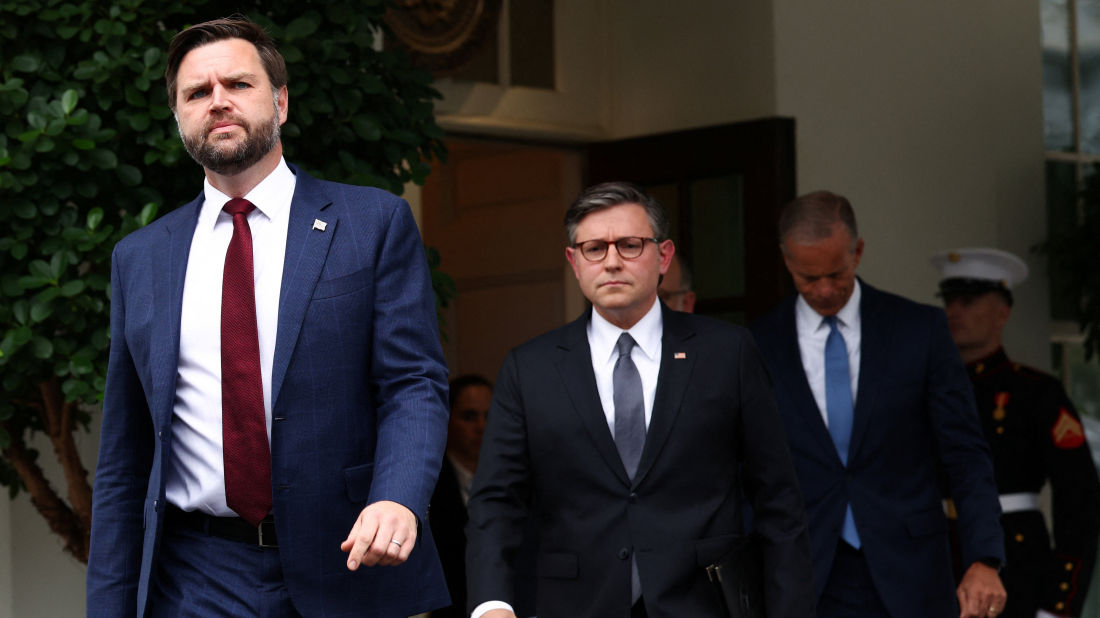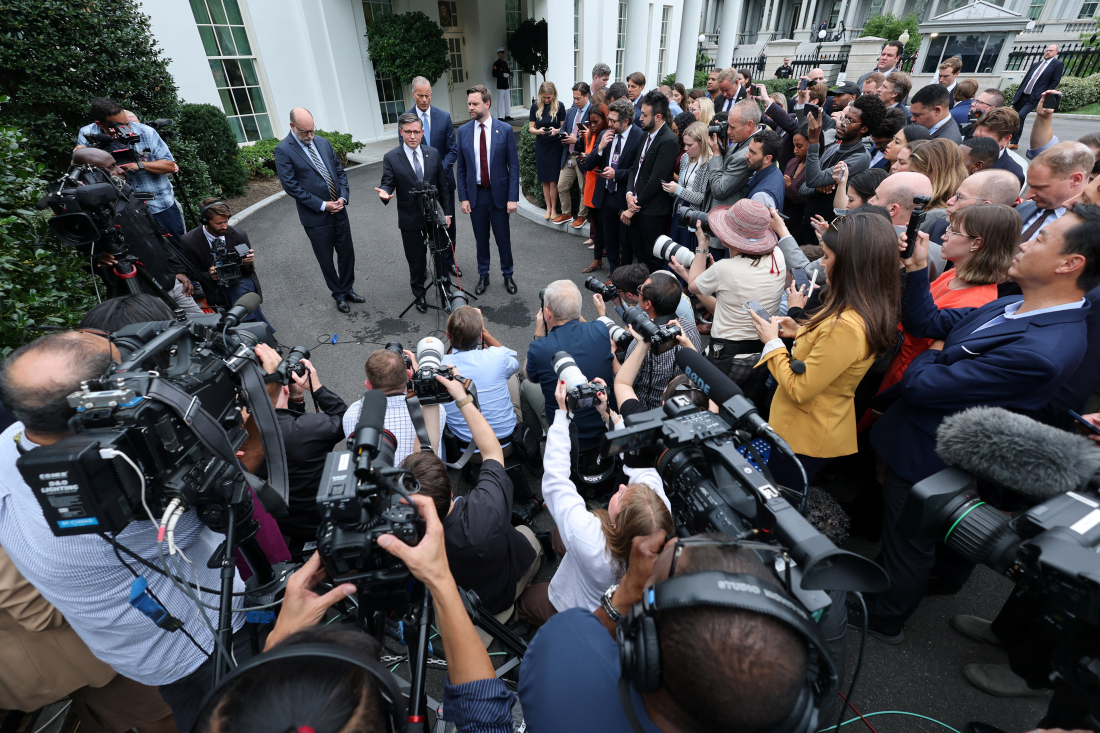U.S. northeast blizzard: Two feet of snow, 5,700 flights cancelled, National Guard deployed
A powerful winter storm has brought large parts of the U.S. Northeast to a standstill, dumping more than a foot of snow across several states and seve...

U.S. President Donald Trump and his Democratic opponents appeared to make little progress at a White House meeting aimed at heading off a government shutdown that could disrupt a wide range of services as soon as Wednesday.
Both sides emerged from the meeting saying the other would be at fault if Congress fails to extend government funding beyond a Tuesday midnight deadline (0400 GMT Wednesday).
"I think we're headed to a shutdown," Vice President JD Vance said.
Democrats say any agreement to extend that deadline must also preserve expiring health benefits, while Trump's Republicans insist health and government funding must be dealt with as separate issues.
Senate Democratic Leader Chuck Schumer said the two sides "have very large differences."
If Congress does not act, thousands of federal government workers could be furloughed, from NASA to the national parks, and a wide range of services would be disrupted. Federal courts might have to close and grants for small businesses could be delayed.
Budget standoffs have become relatively routine in Washington over the past 15 years and are often resolved at the last minute. But Trump's willingness to override or ignore spending laws passed by Congress has injected a new dimension of uncertainty.
Trump has refused to spend billions of dollars approved by Congress and is threatening to extend his purge of the federal workforce if Congress allows the government to shut down. Only a handful of agencies have so far published plans detailing how they would proceed in the event of a shutdown.
The White House released an executive order Monday evening extending the life of more than 20 federal advisory committees through 2027. It remains unclear how these committees - which advise the president in areas including trade and national security - will be funded amid ongoing shutdown uncertainty.

Fight about small slice of budget
At issue is $1.7 trillion in "discretionary" spending that funds agency operations, which amounts to roughly one-quarter of the government's total $7 trillion budget. Much of the remainder goes to health and retirement programmes and interest payments on the growing $37.5 trillion debt.
Prior to the White House meeting, Democrats floated a plan that would extend current funding for seven to 10 days, according to Democratic sources, which could buy time to hammer out a more permanent agreement.
That is shorter than the timeline backed by Republicans, which would extend funding to the 21 November.
After returning to the Capitol, Schumer told reporters he would not accept a shorter funding bill.
Senate Republican Leader John Thune sought to pile pressure on Democrats by scheduling a Tuesday vote on the Republican bill, which has already failed once in the Senate.
There have been 14 partial government shutdowns since 1981, most lasting just a few days. The most recent was also the longest, lasting 35 days in 2018 and 2019 due to a dispute over immigration during Trump's first term.
Healthcare is a sticking point
This time healthcare is at issue. Roughly 24 million Americans who get coverage through the Affordable Care Act will see their costs rise if Congress does not extend temporary tax breaks due to expire at the end of this year.
House Democratic Leader Hakeem Jeffries said Congress needs to make those tax breaks permanent now because higher health insurance premiums are being finalised and the new signup period starts 1 November.
"We believe that simply accepting the Republican plan to continue to assault and gut healthcare is unacceptable," Jeffries said at a Monday press conference.
Republicans say they are willing to consider the issue, but not as part of a temporary spending patch.
"They had some ideas that I actually thought were reasonable, and they had some ideas that the president thought was reasonable. What's not reasonable is to hold those ideas as leverage and to shut down the government," Vance said.
Democrats want to energise their voting base ahead of the 2026 midterm elections, when control of Congress will be at stake, and have broadly lined up behind the healthcare push.
But Democratic aides have privately expressed concerns that a shutdown could create a public backlash if Democrats do not effectively argue their case and instead come off sounding like just being opposed to whatever Trump wants - a stance Republicans like Thune have derided as "Trump Derangement Syndrome."
A seven-month-old Japanese macaque has drawn international attention after forming an unusual bond with a stuffed orangutan toy after being rejected by its mother.
Pakistan said it carried out cross-border strikes on militant targets inside Afghanistan after blaming a series of recent suicide bombings, including attacks during the holy month of Ramadan, on fighters it said were operating from Afghan territory.
Italy said a fond farewell to the Winter Olympics on Sunday with an open-air ceremony in the ancient Verona Arena that celebrated art and sporting achievement at a Games lauded as a model for how to stage such events.
Ukraine’s President Volodymyr Zelenskyy has approved new sanctions targeting Russian maritime operators, defence-linked companies and individuals connected to Moscow’s military and energy sectors, according to official decrees issued on Saturday.
The United States and Iran will hold a new round of nuclear negotiations in Geneva on Thursday as part of renewed diplomatic efforts to reach a potential agreement, Oman’s Foreign Minister Badr Albusaidi announced on Sunday.
Chinese travellers made an estimated 362.58 million cross-regional passenger trips on Monday, the final day of the Spring Festival holiday, according to official data.
Thousands of people gathered across Europe and beyond over the weekend in solidarity with Ukraine, as the war with Russia entered its fifth year.
A powerful winter storm has brought large parts of the U.S. Northeast to a standstill, dumping more than a foot of snow across several states and severely disrupting transport and daily life.
The United Nations mission in Afghanistan said on Monday it had received “credible reports” that at least 13 civilians were killed and seven others injured in overnight Pakistani airstrikes inside Afghanistan.
The former British ambassador to the U.S. Peter Mandelson has been arrested by police in London on suspicion of misconduct in public office.
You can download the AnewZ application from Play Store and the App Store.

What is your opinion on this topic?
Leave the first comment